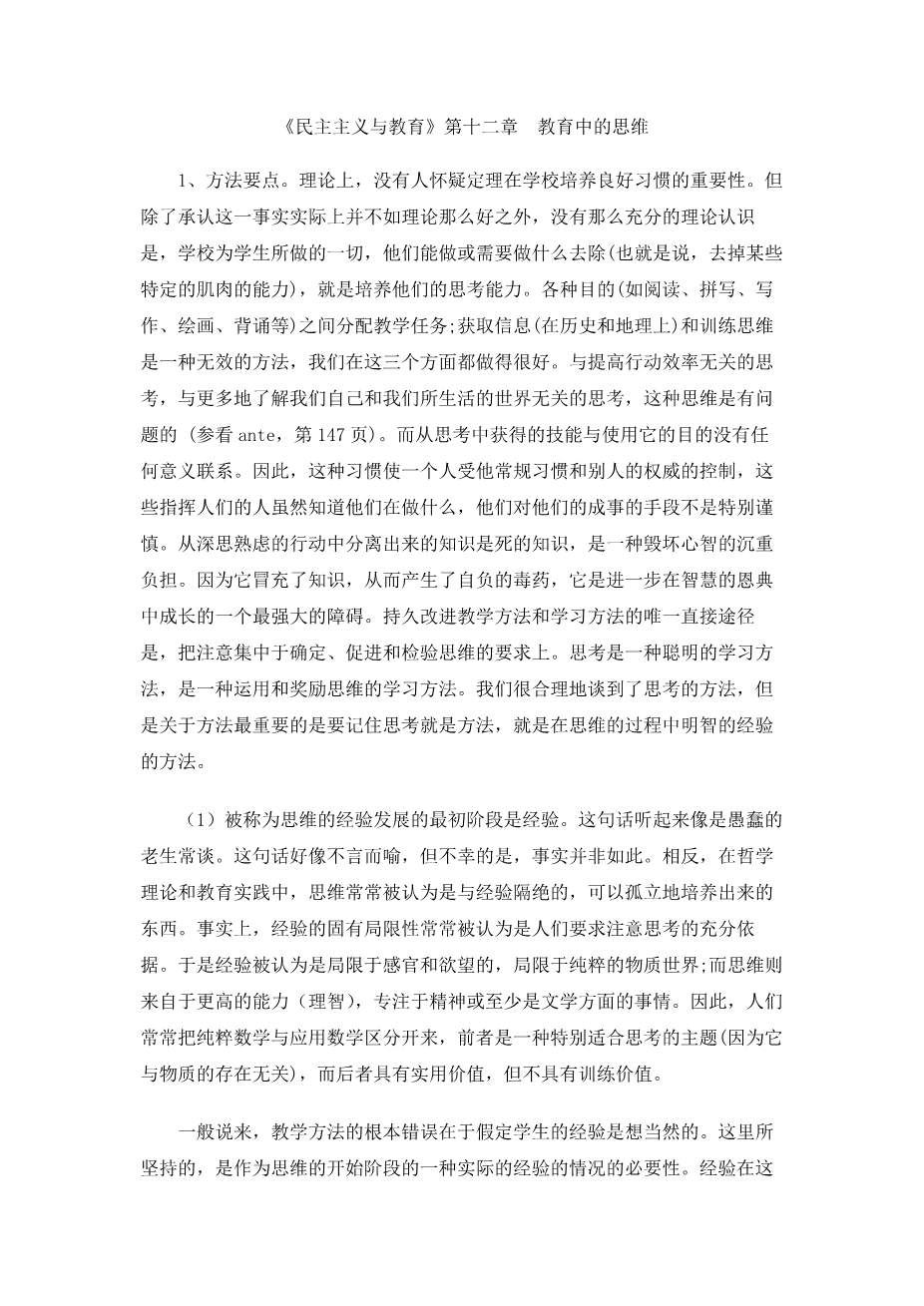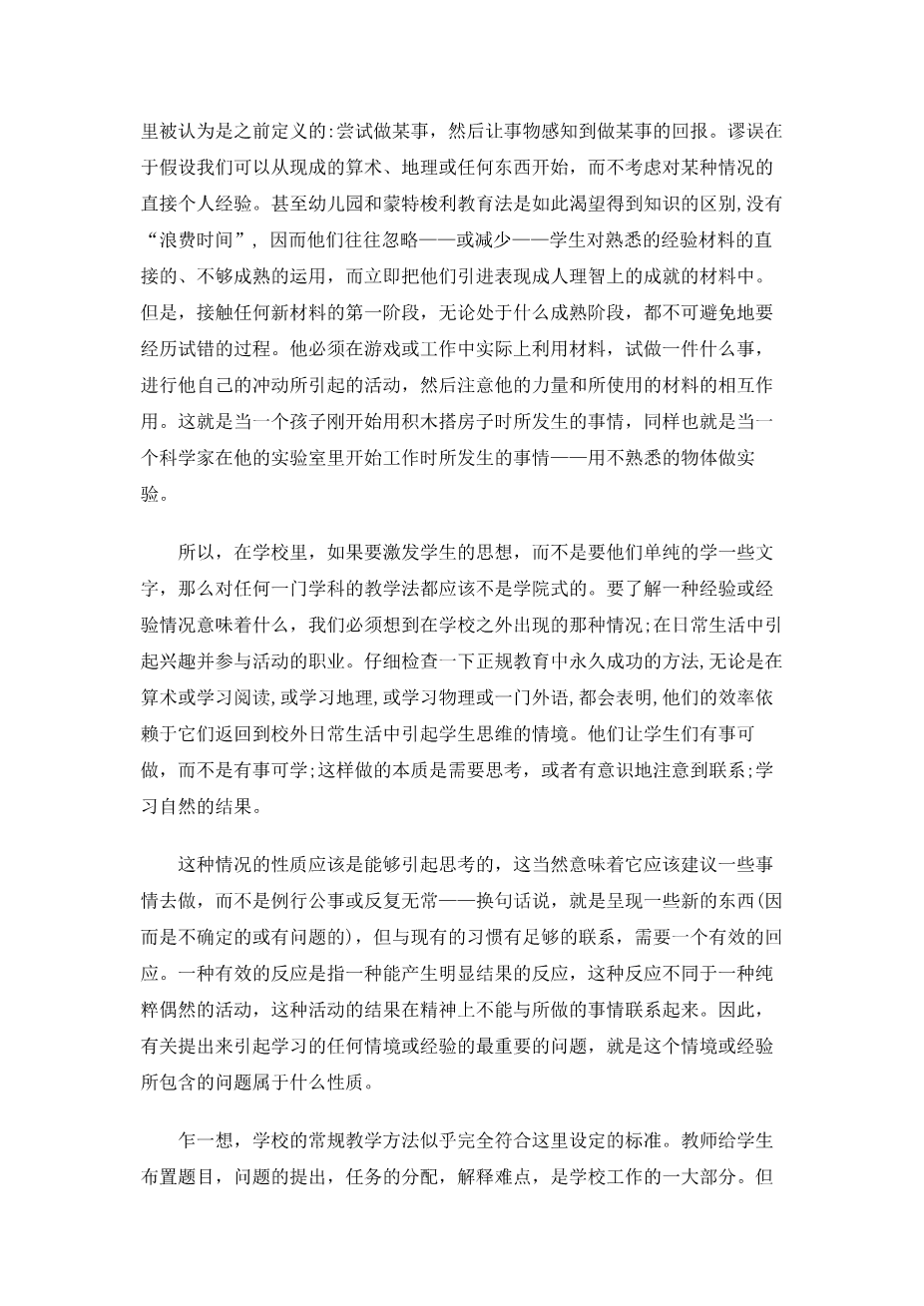Democracy and Education
Chapter Twelve: Thinking in Education
1. The Essentials of Method. No one doubts, theoretically, the importance of fostering in school good habits of thinking. But apart from the fact that the acknowledgment is not so great in practice as in theory, there is not adequate theoretical recognition that all which the school can or need do for pupils, so far as their minds are concerned (that is, leaving out certain specialized muscular abilities), is to develop their ability to think. The parceling out of instruction among various ends such as acquisition of skill (in reading, spelling, writing, drawing, reciting); acquiring information (in history and geography), and training of thinking is a measure of the ineffective way in which we accomplish all three. Thinking which is not connected with increase of efficiency in action, and with learning more about ourselves and the world in which we live, has something the matter with it just as thought(See ante, p. 147). And skill obtained apart from thinking is not connected with any sense of the purposes for which it is to be used. It consequently leaves a man at the mercy of his routine habits and of the authoritative control of others, who know what they are about and who are not especially scrupulous as to their means of achievement. And information severed from thoughtful action is dead, a mind-crushing load. Since it simulates knowledge and thereby develops the poison of conceit, it is a most powerful obstacle to further growth in the grace of intelligence. The sole direct path to enduring improvement in the methods of instruction and learning consists in centering upon the conditions which exact, promote, and test thinking. Thinking is the method of intelligent learning, of learning that employs and rewards mind. We speak, legitimately enough, about the method of thinking, but the important thing to bear in mind about method is that thinking is method, the method of intelligent experience in the course which it takes. I. The initial stage of that developing experience which is called thinking is experience. This remark may sound like a silly truism. It ought to be one; but unfortunately it is not. On the contrary, thinking is often regarded both in philosophic theory and in educational practice as something cut off from experience, and capable of being cultivated in isolation. In fact, the inherent limitations of experience are often urged as the sufficient ground for attention to thinking. Experience is then thought to be confined to the senses and appetites; to a mere material world, while thinking proceeds from a higher faculty (of reason), and is occupied with spiritual or at least literary things. So, oftentimes, a sharp distinction is made between pure mathematics as a peculiarly fit subject matter of thought (since it has nothing to do with physical existences) and applied mathematics, which has utilitarian but not mental value.
Speaking generally, the fundamental fallacy in methods of instruction lies in supposing that experience on the part of pupils may be assumed. What is here insisted upon is the necessity of an actual empirical situation as the initiating phase of thought. Experience is here taken as previously defined: trying to do something and having the thing perceptibly do something to one in return. The fallacy consists in supposing that we can begin with ready-made subject matter of arithmetic, or geography, or whatever, irrespective of some direct personal experience of a situation. Even the kindergarten and Montessori techniques are so anxious to get at intellectual distinctions, without “waste of time,” that they tend to ignore—or reduce —the immediate crude handling of the familiar material of experience, and to introduce pupils at once to material which expresses the intellectual distinctions which adults have made. But the first stage of contact with any new material, at whatever age of maturity, must inevitably be of the trial and error sort. An individual must actually try, in play or work, to do something with material in carrying out his own impulsive activity, and then note the interaction of his energy and that of the material employed. This is what happens when a child at first begins to build with blocks, and it is equally what happens when a scientific man in his laboratory begins to experiment with unfamiliar objects. Hence the first approach to any subject in school, if thought is to be aroused and not words acquired, should be as unscholastic as possible. To realize what an experience, or empirical situation, means, we have to call to mind the sort of situation that presents itself outside of school; the sort of occupations that interest and engage activity in ordinary life. And careful inspection of methods which are permanently successful in formal education, whether in arithmetic or learning to read, or studying geography, or learning physics or a foreign language, will reveal that they depend for their efficiency upon the fact that they go back to the type of the situation which causes reflection out of school in ordinary life. They give the pupils something to do, not something to learn; and the doing is of such a nature as to demand thinking, or the intentional noting of connections; learning naturally results. That the situation should be of such a nature as to arouse thinking means of course that it should suggest something to do which is not either routine or capricious—something, in other words, presenting what is new(and hence uncertain or problematic) and yet sufficiently connected with existing habits to call out an effective response. An effective response means one which accomplishes a perceptible result, in distinction from a purely haphazard activity, where the consequences cannot be mentally connected with what is done. The most significant question which can be asked, accordingly, about any situation or experience propos
剩余内容已隐藏,支付完成后下载完整资料


英语译文共 6 页,剩余内容已隐藏,支付完成后下载完整资料
资料编号:[424675],资料为PDF文档或Word文档,PDF文档可免费转换为Word


